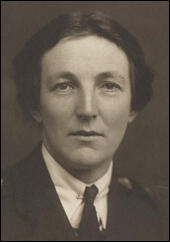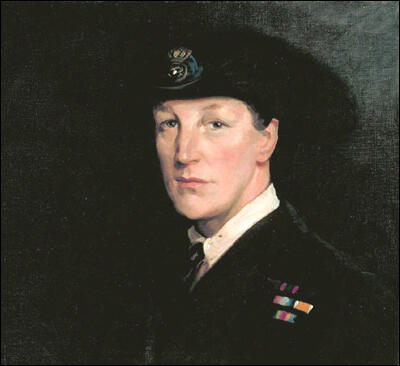Katharine Furse

Katharine Symonds, the daughter of the historian, John Addington Symonds and Janet Catherine, was born on 23rd November 1875. Educated by governesses and her mother she spent most of her early life in Switzerland and Italy.
Katharine had intended to train as a hospital nurse but after meeting the artist, Charles Wellington Furse, she changed her plans. The couple were married in 1900 but Furse died four years later leaving her with two young children.
In 1909 Katharine Furse joined the Red Cross Voluntary Aid Detachment that was attached to the Territorial Army. On the outbreak of the First World War Furse was chosen to head the first Voluntary Aid Detachment unit to be sent to France. Aware of her administrative abilities, the authorities decided to place Furse in charge of the VAD Department in London. By 1916 she was appointed Commander-in-Chief and the following year became one of the five women appointed Dame Grand Cross, a newly created Order of the British Empire.
Although considered a great success as head of the Voluntary Aid Detachment, Furse was unhappy about her lack of power to introduce reforms. In November 1917, Furse and several of her senior colleagues resigned. Furse was immediately offered the post as Director of the Women's Royal Naval Service (WRNS).
The Royal Navy was the first of the armed forces to recruit women and since 1916 the Women's Royal Naval Service took over the role of cooks, clerks, wireless telegraphists, code experts and electricians. The women were so successful that other organizations such as the Women's Army Auxiliary Corps (WAAC) and the Women's Royal Air Force were also established.

After the war Furse joined the travel agency of Sir Henry Lunn. Working mainly in Switzerland, Furse became an expert skier and did a great deal to popularize the sport with British tourists. He achievements were acknowledged when she became President of the Ladies' Ski Club.
In 1920 formed the Association of Wrens and this led to her becoming head of the Sea Rangers and for ten years was director of the World Association of Girl Guides and Girl Scouts. Her autobiography, Hearts and Pomegranates was published in 1940. Katharine Furse died in London on 25th November, 1952.
Primary Sources
(1) Letter from Katharine Furse, B.R.C.S., the Commandant-in-Chief, Women's Voluntary Aid Detachment, to serving nurses (1914)
This paper is to be considered by each V.A.D. member as confidential and to be kept in her Pocket Book.
You are being sent to work for the Red Cross. You have to perform a task which will need your courage, your energy, your patience, your humility, your determination to overcome all difficulties.
Remember that the honour of the V.A.D. organisation depends on your individual conduct. It will be your duty not only to set an example of discipline and perfect steadiness of character, but also to maintain the most courteous relations with those whom you are helping in this great struggle.
Be invariably courteous, unselfish and kind. Remember that whatever duty you undertake, you must carry it out faithfully, loyally, and to the best of your ability.
Rules and regulations are necessary in whatever formation you join. Comply with them without grumble or criticism and try to believe that there is reason at the back of them, though at the time you may not understand the necessity.
Sacrifices may be asked of you. Give generously and wholeheartedly, grudging nothing, but remembering that you are giving because your Country needs your help. If you see others in better circumstances than yourself, be patient and think of the men who are fighting amid discomfort and who are often in great pain.
Those of you who are paid can give to the Red Cross Society which is your Mother and which needs more and more money to carry on its great work. their Mother Society and thus to the Sick and Wounded.
Let our mottos be 'Willing to do anything' and 'The People give gladly'. If we live up to these, the V.A.D. members will come out of this world war triumphant.
(2) Poem sent out by Katharine Furse to all VAD nurses (1914)
And only the Master shall praise us, and only the Master shall blame.
And no one shall work for money, and no one shall work for fame,
But each for the joy of working, and each in his separate star,
Shall draw the thing as he sees it for the God of things as they are.

